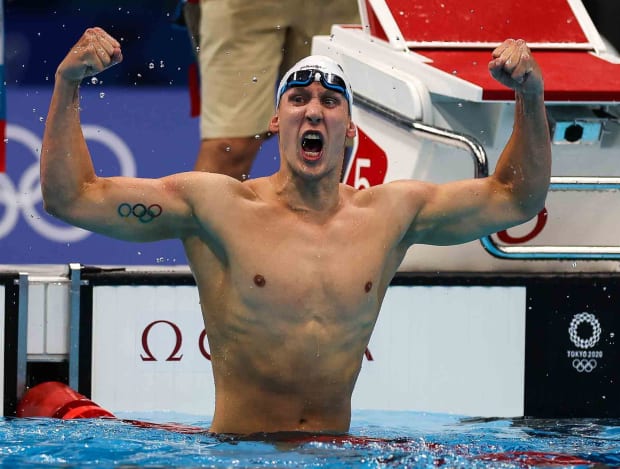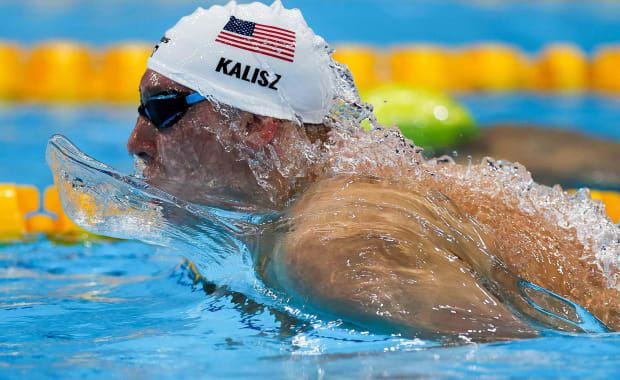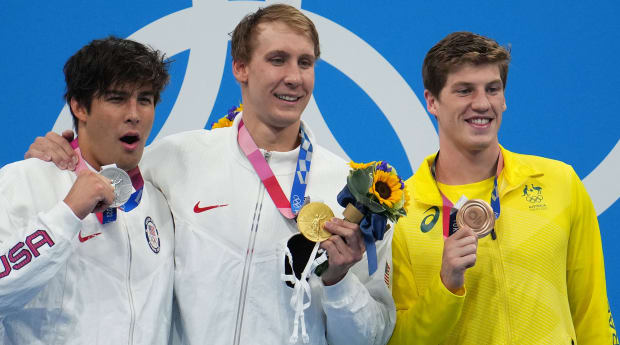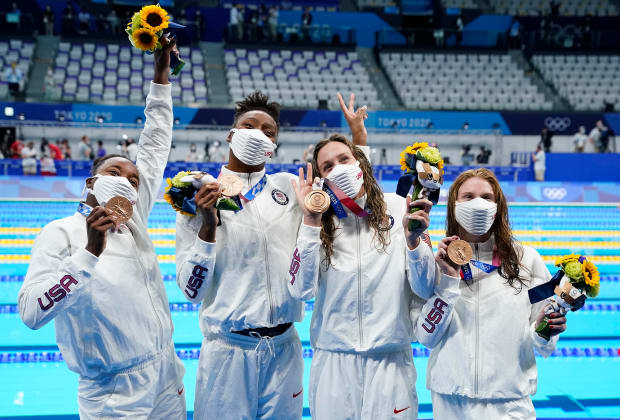Team USA's powerhouse performance in Tokyo marked the best opening day in U.S. Olympic swimming history, with six medals total.
TOKYO — Five years ago, Chase Kalisz looked like the saddest silver medalist in Rio de Janeiro. He finished second in the 400-meter individual medley to Japan’s Kosuke Hagino in a blazing race, with both men posting top 10 times in world history, but only one man could wear the gold medal. Kalisz could barely muster even a forced smile on the marching photo op around the pool deck; between poses his face lapsed into solemnity.
“It was pretty devastating for me in my head,” Kalisz says.
All he could think about, in the moment, was failing to keep alive the American gold medal legacy in that event. The United States had won the 400 IM at every Olympics from 1996-2012, from Tom Dolan (twice) to Michael Phelps (twice) to Ryan Lochte. Kalisz, a Phelps protege growing up at North Baltimore Aquatic Club, took the role of torch bearer in that event very seriously.
“I was the first who let the U.S. down in the 400 IM in a long time,” he says.

Five years later, Kalisz lifted the U.S. up here on Sunday. Set it off. In the process of accomplishing “the one thing I’ve dreamt of for as long as I can remember,” the 27-year-old launched a tidal wave on America’s most medal-heavy first day of swimming in Olympic history.
In the first event of the day, Kalisz dominated the breaststroke leg on the way to 400 IM gold while late-charging Jay Litherland snuck in for silver—a triumph for American teammates and University of Georgia alums, guys who have trained maniacally next to each other for seven years under the great Jack Bauerle. “They’re connected at the hip,” Bauerle says. “You can’t fool Mother Nature in that event. You have to put in the work.”
That 1-2 finish lit the fuse in front of their wildly cheering teammates in an otherwise muted arena. “That got us going,” says U.S. women’s coach Greg Meehan. “We just rolled from there.”
Four more American medals followed: Kieran Smith won a surprise bronze out of Lane 7 in a shocker of a 400 freestyle; Emma Weyant and Hali Flickinger went 2-3 in the women’s 400 IM; and the women’s 400 freestyle relay, which rolled the dice on its lineup after a shaky qualifying performance and earned a bronze.

A day after opening these Tokyo Games with a goose egg in the medal count, the U.S. swimmers made the podium in every finals event. The first swimming finals session in Rio yielded just three medals, and now that’s been doubled here. In the post-Phelps Era, this was a powerful flex.
Not even in boycott-affected Olympics had the U.S. had an opening day like this. Not even back in the day when countries could bring three swimmers per event, instead of the current cap of two.
The American swimming weekend was so strong that even a guy who wasn’t here made waves. Teenager Carson Foster, who finished third by less than two-tenths of a second in the 400 IM at Olympic Trials, just barely missing the team, dropped a 4:08 400 IM in a meet in Texas that stands as the fastest time in the world this year.
“He’s a fighter,” Litherland says of Foster. “This next generation of 400 IM, it will be a fun one.”
In Omaha, Litherland did to Foster what he did to several swimmers here Sunday: snatched his soul in the stretch. The 25-year-old Litherland is a ferocious closer in the 400 IM, unleashing a final leg of freestyle that routinely brings him back into contention when races appear lost.
He was sixth after 300 meters in this race, 1.6 seconds behind second place. He wound up with silver. “Having that last little bit of juice at the end was kind of rooted at an early age,” says Litherland, a triplet who grew up swimming in Atlanta with brothers Kevin and Mick.
But honestly, this comeback was tame compared to the one that got him to Tokyo. Litherland was 2.94 seconds behind Foster going into the final 100, so far back that Bauerle says he “actually stopped looking.” Lesson: never, ever stop looking when Jay Litherland is swimming the 400 IM.

The other lesson: time doesn’t matter at the Olympics, place does. The stunning prelims flop by Japanese top seed Daiya Seto, missing the final, opened the door for Kalisz to win without having to post a freakish time. He declared his winning mark of 4:09.42 “pretty terrible,” and he’s not wrong—it’s more than three seconds slower than his lifetime best, and it’s the slowest time to win gold in this event since 2000. Yui Ohashi’s winning time in the women’s race of 4:32.08 was the slowest winning time since 2004.
Two potential reasons: the pandemic everywhere, and the flipping of the clock here. In order to appease NBC and its American viewing audience, the schedule was reversed from normal meets: preliminaries are at night, finals in the morning. For creatures of extreme habit like swimmers, this is a major adjustment.
American relay swimmer Natalie Hinds said she slept an hour between prelims Saturday night and finals Sunday. Kalisz said he was awake at 4 a.m. Japan time. As happy as the U.S. team was leaving the venue Sunday, there was concern about finding rest time and bringing fresh swimmers to finals.
We all probably underestimated this factor because of Phelps. He somehow won eight gold medals on this disorienting schedule in 2008, a feat that looks all the more remarkable today. “What Michael did in 2008 is absolutely mind-blowing,” Flickinger says.
Flickinger and Weyant continued the American theme of collective excellence in the individual medley. Weyant pushed Ohashi hard in the final 100 meters before taking silver, while Flickinger ran down reigning gold medalist Katinka Hosszú to get herself on the podium. It marked the first time since 1968 that Americans won two of three medals in that event.
And then there were the bronze medals by Smith in the men’s 400 free and the women’s relay. Smith entered competition here seeded seventh, so making the podium was a major step up in what has been a weak event for many years for America. For the U.S. to earn as many medals in the 400 freestyle as the Australians—who love their distance freestyle—was a major surprise.
Not as big a surprise as the winner himself, 18-year-old Ahmed Hafnaoui of Tunisia, who barely qualified for the final and shocked everyone coming out of Lane 8. Asked what he knew about Hafnaoui coming into the race, Smith laughed and said, “Nothing. Nothing at all.” Two years ago, Hafnaoui recorded a time of 3:52 in the 400 free at world juniors; two years later he was nine seconds faster and an instant national hero. The Tunisian media literally pulled him every which way for interviews outside the venue, grabbing him and moving him around—removing his mask by hand at one point for better video quality.
The last final of the day was the women’s relay, and that carried plenty of its own drama. The Americans were a shaky fifth in preliminaries and facing the specter of not earning a medal for the first time since 1912. (Winning was out of the question, with the Australians breaking the world record.) “We were not leaving the meet without a medal in that event,” Meehan says. “But to do that, we knew we had to be better than in prelims.”

So the coaching staff decided Saturday night to swap out three prelims swimmers instead of the usual two. That meant a ride-or-die play with America’s best relay swimmer, even though she was far from at her best. That’s Simone Manuel, who didn’t even make the Olympic Trials final in the 100 freestyle after missing weeks of practice due to overtraining syndrome. Manuel couldn’t break 54 seconds at Trials; could she step up in this cauldron of pressure and deliver?
“We saw enough” from Manuel in training camp, Meehan says, with a smile that hinted this was something of a leap of faith. “We knew Simone’s historical performance on relays. You can trust she’s going to give you everything she has. We were confident she could get up in that moment and give us a great swim.”
As the anchor, Manuel also needed help from America’s first three swimmers. Erika Brown led off with a fairly pedestrian 54.02 that left the U.S. sixth, but that’s a tough spot—several other teams led off with their best freestyler, putting Brown in position to fight through waves. Second leg Abbey Weitzeil—“the hammer,” says Meehan—moved the U.S. up to fourth with the best American split (52.68), Hinds nudged the Americans up one more place with her second straight strong swim (53.15). Then Manuel dueled with Canadian Penny Oleksiak for second, with Oleksiak hitting the wall .03 ahead.
Manuel’s time of 52.96, while well off her fastest relay split, more than justified her inclusion on the relay. “That’s the best she’s been in eight months,” Meehan says. Manuel at least made sure the Americans extended their century-plus streak of medaling in the 400-freestyle relay through another Olympiad.
It capped an inspiring morning of American swimming, with the promise of more to come.
“I’m amped to see my teammates win,” says the firestarter, Kalisz. “I’m amped to swim again. And I think we’ve got a lot left.”
More Olympics Coverage: